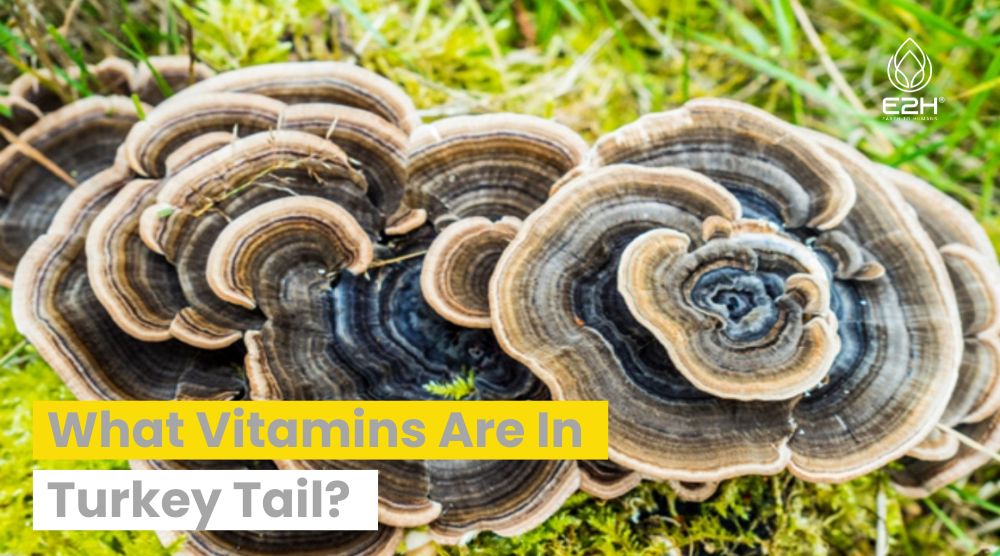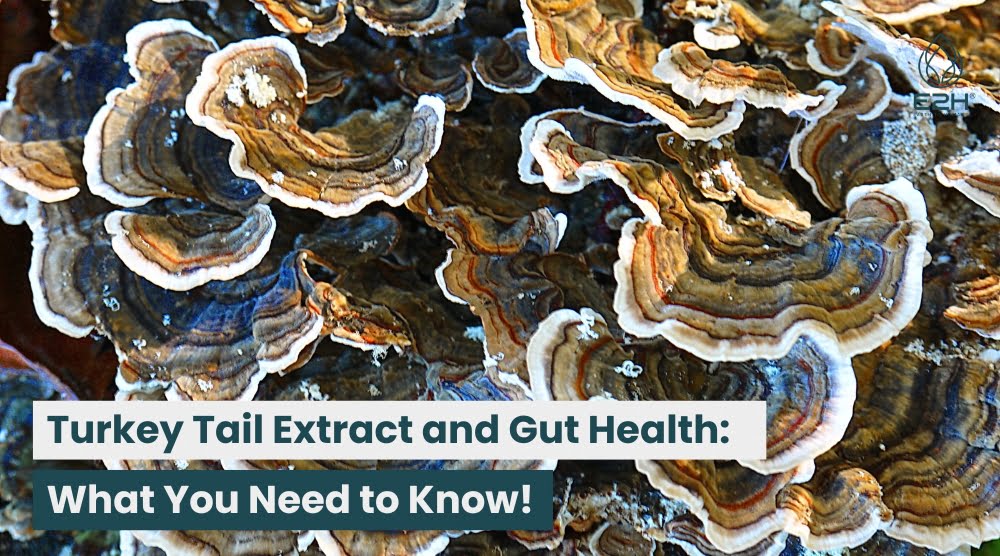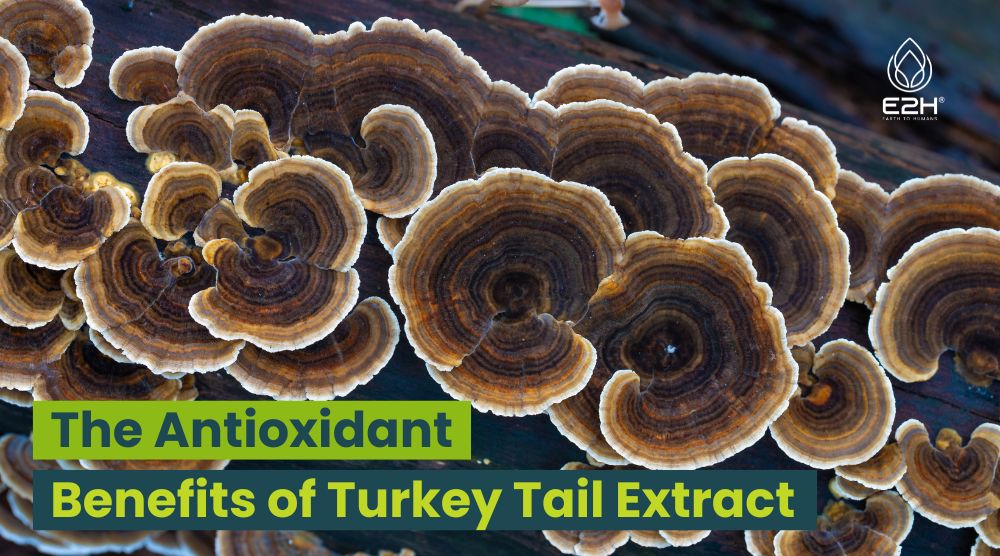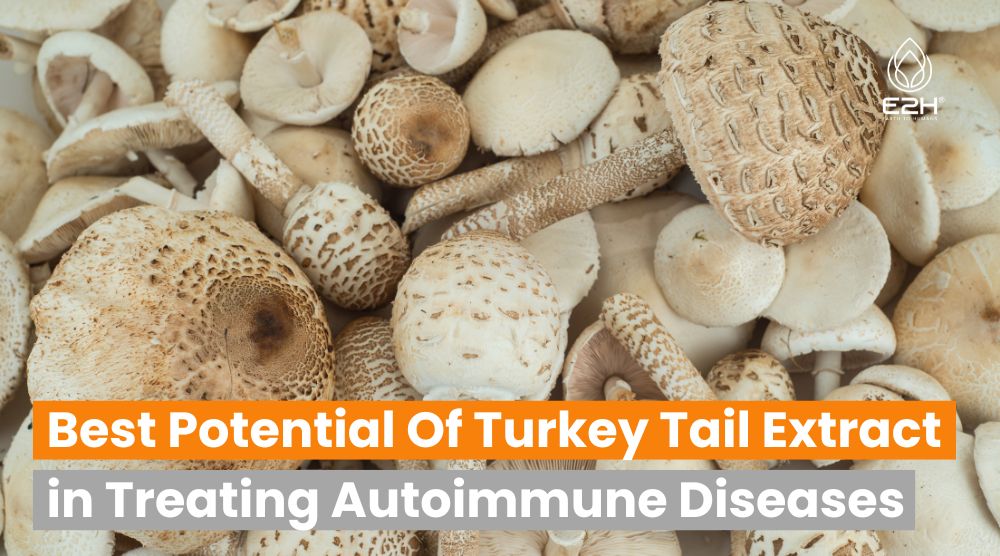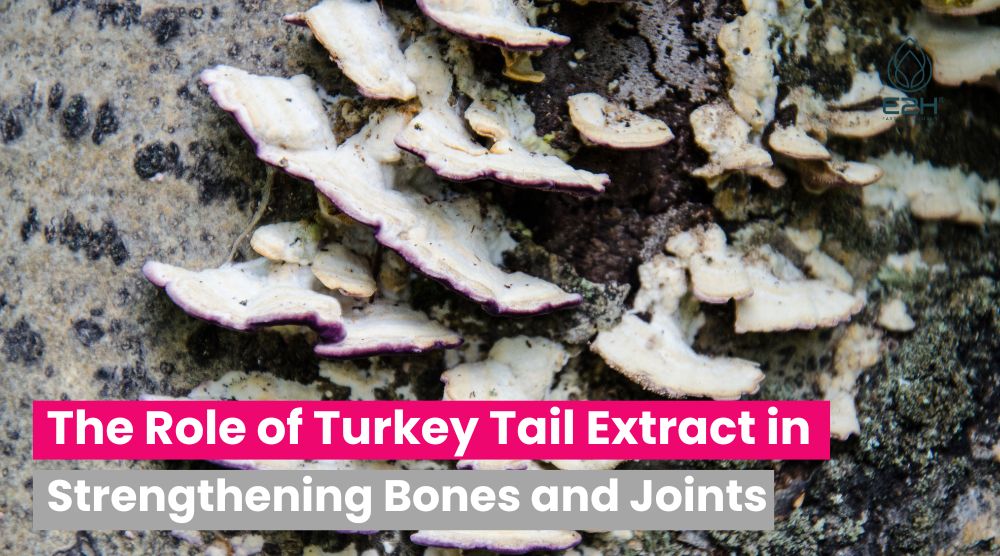What Vitamins Are In Turkey Tail: Turkey tail mushrooms contain vitamins such as D, B3, B2, B1, B5, B6, B9, C, E, and K, which contribute to bone health, and immune system function, energy production, brain function, and overall well-being.
Understanding Turkey Tail
Turkey tail is a common woodland medicinal mushroom, characterized by its vibrant and colorful concentric rings on its cap, which resemble the tail feathers of a wild turkey. It grows on dead hardwood trees and logs, primarily in North America, Europe, and Asia. The turkey tail mushroom supplement has been used for centuries in traditional Chinese and Japanese medicine due to its potential health-enhancing properties.
Key Vitamins Found in Turkey Tail
Turkey, turkey tail mushroom contains a wide range of vitamins that contribute to its nutritional value. Let’s take a closer look at some of the essential vitamins found in this mushroom:
Vitamin D
Vitamin D is a fat-soluble vitamin that plays a crucial role in supporting bone health, regulating the immune system, reducing inflammation, and aiding in the absorption of calcium and phosphorus. Turkey tail contains vitamin D, which can be particularly beneficial for individuals with limited sun exposure or those who follow a plant-based diet.

Vitamin B3 (Niacin)
Vitamin B3, also known as niacin, is involved in energy production, DNA repair, and the maintenance of healthy skin cancer cells white blood cell,, and nerves. Turkey tail contains niacin, which contributes to overall cellular function and helps convert food into usable energy.
Vitamin B2 (Riboflavin)
Riboflavin, or vitamin B2, is essential for the metabolism of carbohydrates, fats, and proteins. It also acts as an antioxidant, protecting the body against damage from harmful free radicals. Turkey tail contains riboflavin, which supports energy production and plays a vital role in maintaining healthy skin and eyes.
Vitamin B1 (Thiamine)
Thiamine, or vitamin B1, is involved in the conversion of carbohydrates into energy and supports the proper functioning of the nervous system. Turkey tail contains thiamine, which helps regulate metabolism and promotes overall well-being.
Vitamin B5 (Pantothenic Acid)
Pantothenic acid, or vitamin B5, is necessary for the synthesis of coenzyme A, which is involved in numerous metabolic reactions. It plays a crucial role in energy production, hormone synthesis, and the maintenance of healthy skin and hair. Turkey tail contains pantothenic acid, which contributes to overall cellular health and helps the body utilize nutrients effectively.
Vitamin B6 (Pyridoxine)
Vitamin B6 is involved in over 100 enzymatic reactions, including the metabolism of amino acids, the synthesis of neurotransmitters, and the production of red blood cells. Turkey tail contains vitamin B6, which supports brain function, hormone regulation reducing inflammation, and immune system health.
Vitamin B9 (Folate)
Folate, or vitamin B9, is essential for DNA synthesis and cell division. It is particularly important for pregnant women, as it aids in fetal development. Turkey tail contains folate, which supports overall cell growth and replication.
Vitamin C
Vitamin C is a potent antioxidant that supports the immune response and function, collagen synthesis, and iron absorption. Turkey tail contains vitamin C, which helps protect cells from damage, enhances the immune response, responses reduce inflammation, and promotes healthy skin.
Vitamin E
Vitamin E is a fat-soluble antioxidant that protects cell membranes from oxidative stress. It also supports healthy immune system and function and promotes healthy skin. Turkey tail contains vitamin E, which contributes to overall cellular health and helps maintain the integrity of various tissues cancer cells in the body.
Vitamin K
Vitamin K is essential for blood clotting and plays a role in bone and liver health too. Turkey tail contains vitamin K, which contributes to proper blood coagulation and supports bone metabolism.
Health Benefits of Turkey Tail Vitamins
The vitamins present in turkey tail offer a range of health benefits:
Strong Immune System
The combination of vitamins in turkey tail, including vitamin D, vitamin C, and vitamin B6, helps strengthen the immune system, promoting the body’s ability to defend against potentially harmful bacteria and pathogens and maintain overall health.

Cellular Health
Vitamins B2, B3, B5, and E found in turkey tail play a crucial role in maintaining cellular health. They support energy production, DNA repair, and protect cells from oxidative stress, ensuring optimal functioning and longevity.
Energy Production
The B-vitamins present in turkey tail, such as niacin, riboflavin, thiamine, and pantothenic acid, play a vital role in converting food into energy. Including turkey tail in your diet can provide the necessary vitamins to support healthy metabolism and sustainable energy levels.
Brain Function
Turkey tail’s vitamin B6 content supports brain health and cognitive function. It aids in the production of neurotransmitters, such as serotonin and dopamine, which are essential for mood regulation, memory, and overall cognitive performance.
Antioxidant Activity
Turkey tail’s vitamin C and vitamin E content act as powerful antioxidants, protecting cells from damage caused by free radicals. By neutralizing harmful molecules, these vitamins help reduce the body weight risk of chronic diseases and support the body weight overall well-being of cancer patients.
How to Incorporate Turkey Tail Vitamins into Your Diet?
There are a few ways to incorporate turkey tail vitamins into your diet:
Consuming Turkey Tail as a Supplement
Turkey turkey tail extract is available in various forms, including capsules, powders, and extracts. These turkey tail supplements are convenient and provide a concentrated dose of the vitamins found in turkey tail. However, it is essential to choose high-quality products from reputable sources to ensure purity and efficacy of the turkey tail extract and benefits.
Precautions and Dosage Recommendations
While the turkey tail mushroom extract is generally safe for consumption, it’s crucial to follow the recommended dosage and consult a healthcare professional, especially if you have underlying health conditions or are taking medications. Additionally, if you decide to forage for wild or turkey tail extract or mushrooms, it is essential to have proper identification skills or purchase from trusted suppliers to avoid potential risks.
What nutrients are in turkey tail?
Turkey tail mushrooms are rich in various nutrients that contribute to their nutritional value. They contain essential vitamins, such as vitamin D, vitamin B complex (including niacin, riboflavin, thiamine, pantothenic acid, pyridoxine, folate), vitamin C, vitamin E, and vitamin K.
Turkey tail mushrooms provide minerals like potassium, copper, selenium, and zinc. These nutrients support overall health, including, immune system function, cellular health, energy production, brain function, and antioxidant activity. Incorporating turkey tail mushrooms into your diet can be a valuable way to obtain these beneficial nutrients.
What are the active ingredients in turkey tail?
Turkey tail mushrooms contain various active compounds that contribute to their potential health benefits. The primary active ingredients in turkey tail mushroom are polysaccharopeptides (PSP) and polysaccharides, specifically beta-glucans. These compounds are known for their immune-modulating properties, which can enhance immune responses and support overall immune function.

Turkey tail mushroom grows and also contains other bioactive compounds, including triterpenoids, flavonoids, and phenols, which possess antioxidant and anti-inflammatory properties. These active ingredients work synergistically to provide the potential health-enhancing effects associated with consuming turkey tail mushroom or mushrooms.
Can I take turkey tail mushrooms everyday?
While turkey tail mushrooms are generally considered safe for consumption, it is important to exercise caution and consult with a healthcare professional before taking them every day. While they offer potential health benefits, individual responses may vary. Additionally, if you have underlying health conditions, take medications, or are undergoing specific treatments, it is crucial to seek professional guidance.
A healthcare professional can assess your individual circumstances, provide appropriate dosage recommendations, and ensure there are no contraindications or interactions with other medications or therapies. Always prioritize your safety and consult with an expert before incorporating any benefits of turkey tail fungus or tails’ or turkey tail mushroom supplement into your daily routine.
What are the benefits of taking turkey tail mushroom supplements?
Turkey tail mushroom supplements have several potential benefits. They are rich in polysaccharides, such as beta-glucans, which can support and modulate the immune system, potentially enhancing immune function. The mushroom also contains powerful antioxidants that can help reduce oxidative stress and protect against cellular damage.
Additionally, turkey tail mushrooms may have prebiotic effects, promoting the growth of beneficial gut bacteria and improving gut health. While promising, further scientific research is needed to fully understand and confirm these benefits and their specific effects on various health conditions.
How To Use Turkey Tail Mushrooms?
FAQs
Can turkey tail mushrooms replace multivitamin supplements?
While turkey tail mushrooms provide beneficial vitamins, they should not replace a well-balanced diet or prescribed supplements. Consult with a healthcare professional to determine which turkey tail mushroom or other medicinal mushrooms that are the best approach for your specific needs.
Are there any potential side effects of consuming turkey tail mushrooms?
In general, turkey tail mushrooms are considered safe. However, individual reactions may vary. It’s advisable to start with small amounts and monitor your body’s response. If any adverse effects occur, discontinue use and consult a healthcare professional.
Can I cook turkey tail mushrooms to retain their vitamin content?
Cooking methods can affect the nutrient content of turkey tails mushrooms. To retain the maximum vitamin content, it is recommended to lightly cook turkey tail mushrooms or consume them in a powdered or supplement form.
Are there any specific contraindications for consuming turkey tail mushrooms?
Individuals with autoimmune disorders lung cancer or those undergoing immunosuppressive treatments for breast cancer should consult with a healthcare professional before incorporating turkey tail mushrooms into their diet.
Can I grow my own turkey tail mushrooms at home?
Yes, turkey tail mushrooms can be grown at home. However, it requires specific growing conditions and expertise. It is recommended to research and follow reliable cultivation guides or consider purchasing from trusted suppliers.
Conclusion
Turkey, turkey tail supplements and mushrooms contain a variety of vitamins that contribute to overall health and well-being. The presence of vitamins D, B complex, C, E, and K provides numerous other benefits of turkey tail, such as a stronger immune system, improved cellular health, enhanced brain function, increased energy, lower blood sugar levels, and antioxidant protection. Incorporating turkey tail supplements and vitamins into your diet, whether through supplements or culinary use, can be a valuable addition to support your overall health.
